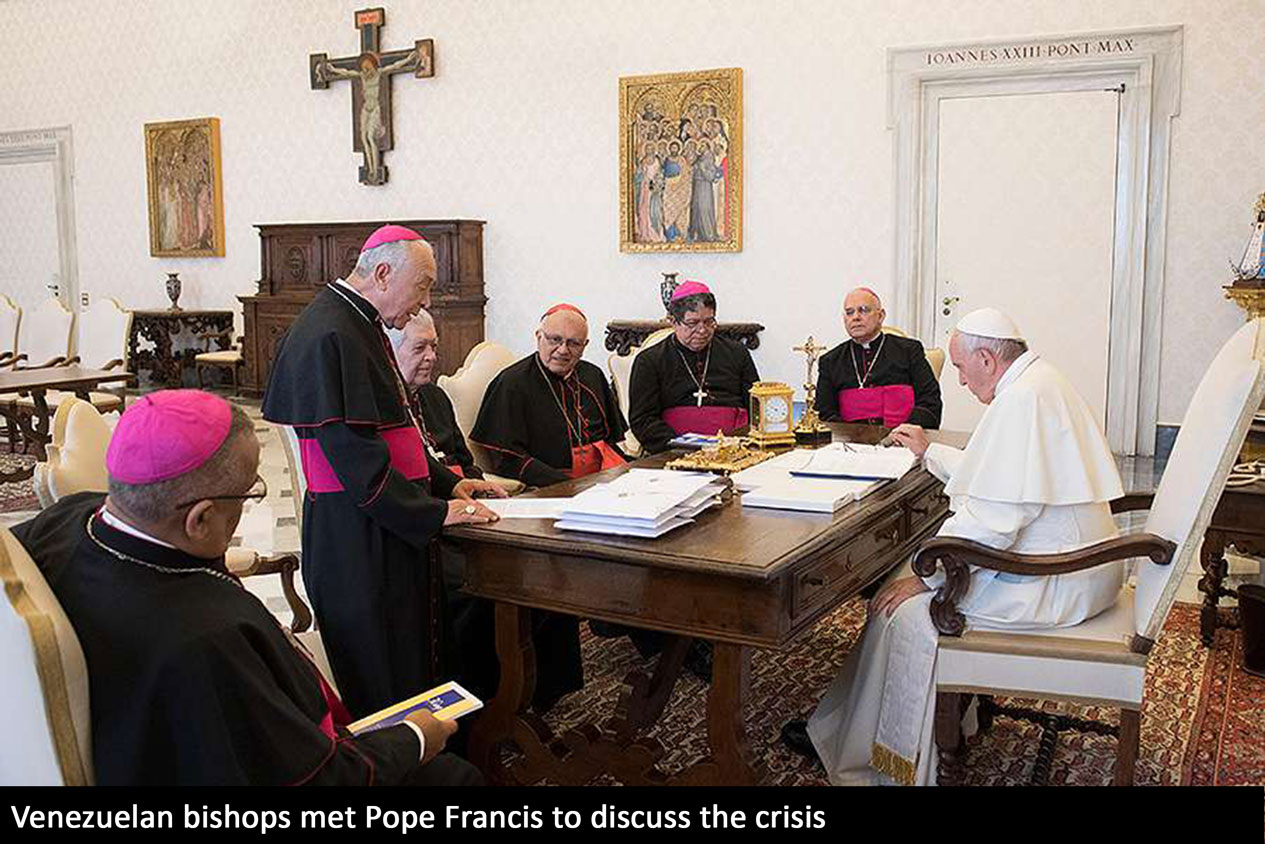VENEZUELA – Bishops meet with Pope to discuss the crisis
Letter from the Episcopal Conference of Venezuela to Pope Francis after the audience
The Presidential Council of the Episcopal Conference of Venezuela requested an emergency meeting with the Pope to talk about the grave situation the country is experiencing. Pope Francis received the leaders of the Venezuelan Episcopal Conference (VEC), in the Apostolic Vatican Palace on Thursday, 8 June. Announced just days before, the meeting was not planned in advance but squeezed into the Pope’s schedule. The private audience lasted half an hour.
During the meeting to discuss the ongoing crisis in Venzuela, the bishops gave the Pope two documents, the first containing a list of some 70 people, mostly youths, who were killed during protests in Caracas and other cities throughout Venezuela. The second was a detailed outline of the work the bishops conference has done so far to help alleviate the crisis.
The delegation was headed by VEC’s President, Monsignor Diego Rafael Padron Sanchez; the First Vice-President, Monsignor Jose Luis Azuaje Ayala; the Second Vice-President, Monsignor Mario del Valle Moronta Rodriguez; the Secretary General, Cardinal Jorge Liberato Urosa Sabino, Archbishop of Caracas; and Cardinal Baltazar Enrique Porras Cardozo, Archbishop of Merida.
After the papal audience, the bishops met with the Vatican Secretary of State, Cardinal Pietro Parolin. Venezuelan Cardinal Urosa also met in Rome with the President of the Italian Senate’s Foreign Relations Commission.
Speaking to a group of journalists after they met with Pope Francis and other Vatican officials, Venezuela’s bishops said they have the Pope’s full support in facing the trials of a regime which oppresses its people to maintain power. The regime is known to have committed gross abuses, including violence, against those who don’t share their political ideologies, and are accused of taking many political prisoners.
“The government has as a goal to maintain power at the cost of the life of any person,” said Archbishop Diego Padrón Sanchez of Cumana, adding that the government “has the desire, the will, the scope, to have a submissive, silent people that doesn’t protest.” To ensure this people must have “no food, no medicine (and) spend every moment trying to resolve daily problems.”
“A people that is oppressed, suffering and sick doesn’t have the strength to raise itself in revolt against anyone,” he stated.
Archbishop Padrón said the Pope was “very well informed” on the situation and received a daily update on what is going on. The Pope expressed his closeness to the bishops and the “people who are suffering” and was “very moved” by the description of some of the cases the bishops had witnessed recently. Pope Francis had sent a message to Venezuelan bishops following a wave of protests across the country against the government of President Nicolás Maduro, which left more than 30 dead:
“I assure you that I am following with great concern the situation of the beloved Venezuelan people in the face of the grave problems that afflict it. I feel a deep sorrow for the confrontations and violence of these days, which have caused numerous deaths and injuries, and which do not help to solve the problems, but only cause more suffering and pain.”
CELAM, the conference of Latin American Catholic bishops, joined in support of the Venezuelan hierarchy, blaming President Nicolas Maduro for the humanitarian crisis in Venezuela. The country has been engulfed in protests since the Venezuelan supreme court, which Maduro controls, disbanded the National Assembly.
Bishop Castor Oswaldo Azuaje Perez of Trujillo, Venezuela, said in a newspaper interview that the government of Venezuela is now functioning as a dictatorship. He said that “the government is barking up the wrong tree” in attempting to quash public demonstrations without allowing for democratic elections.
However, although they have very real problems with Maduro, Archbishop Padrón said this did not mean that the bishops are on the side of the opposition. “We don’t represent any party, and we don’t want to be on the side of the government or the opposition,” he said. “We want to help the people.” The bishops came “to present to the Holy Father the situation of the Venezuelan people, whether they are those people who are close to the government, or those who feel far from the government. We don’t have any preference in this sense.”
Vatican authorities and Venezuelan bishops have taken the stance expressed by Cardinal Pietro Parolin, formerly the nuncio in Caracas, to foster a reconciliation among the parties. Cardinal Parolin had sent a letter to the parties in mid-December, “in the name and at the behest of the Holy Father.”
In it, he indicated the conditions under which dialogue with the Maduro regime ought to be carried out:
- humanitarian channels to guarantee the population food and medicine
- re-establishment of the National Assembly and restitution to the parliament (in which the opposition groups are in the majority) of the prerogatives stipulated by the constitution
- release of political prisoners
- new free elections.
Pope Francis, who has repeatedly urged dialogue between sectors in Venezuela, had criticized a section of the opposition for not being disposed to talks. The opposition groups wrote a letter to the pope in which “not divided but unanimous” they said that they agree to the conditions set by Cardinal Parolin and indicated free elections as the only way out of the crisis. However, the Maduro presidency refuses to meet any of the conditions.
ACN Malta





